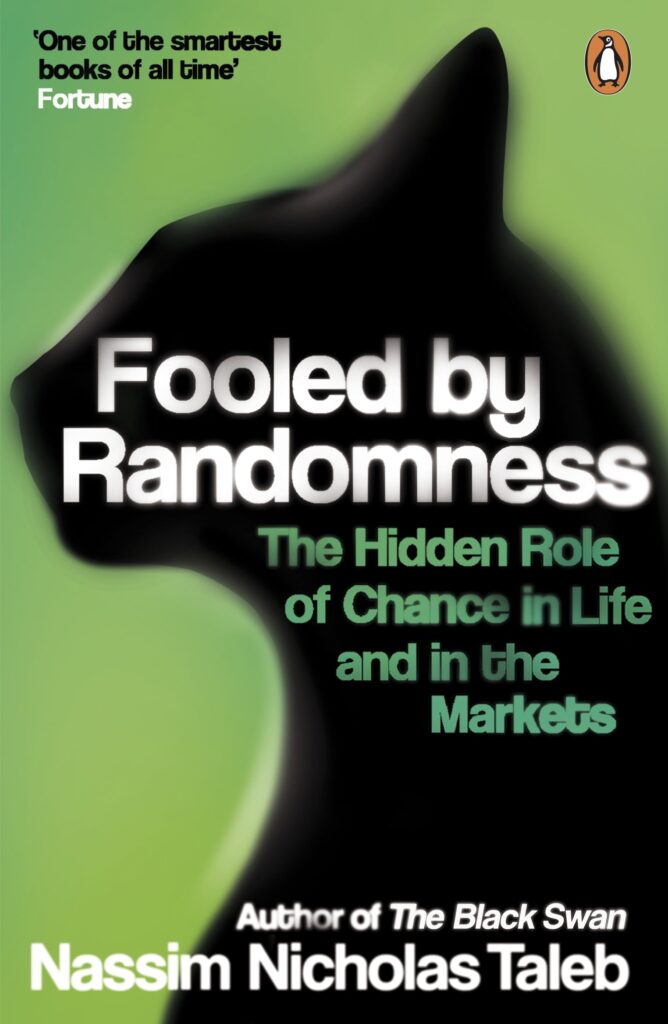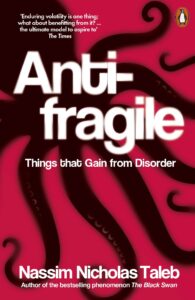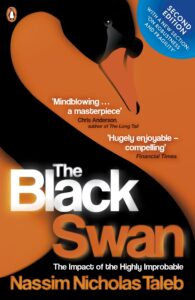
Fooled by Randomness:
The Hidden Role of Chance in Life and in the Markets

On this page:
- ⭐ Key Notes
- Part I: Solon’s Warning
- 🎸 Chapter 1: if you’re so rich, why aren’t you so smart?
- 🔫 Chapter 2: a bizzare accounting method
- 🎲 Chapter 3: a mathematical meditation on history
- 🖼 Chapter 4: randomness, nonsense, and the scientific intellectual
- 🧬 Chapter 5: survival of the least fit
- ⚖ Chapter 6: skewness and asymmetry
- 🦢 Chapter 7: the problem of induction
- Part II: Monkeys On Typewriters
- Part III: Wax In My Ears
- 📹 Video Summary
- 📚 Related Books
⭐ Key Notes
- We underestimate the share of randomness in everything.
- We are blind to probabilities.
- We attribute success to skill, but failure to randomness.
- Think in terms of expected value.
- Life is nonlinear and small acts can have disproporionate consequences.
- Consider alternative hisories and what could have happened.
Part I: Solon’s Warning
- That which is gained by chance, can also be taken away by luck.
- Things that require little luck are more resistant to randomness.
🎸 Chapter 1: if you’re so rich, why aren’t you so smart?
- Mild success can be explainable by skill.
- Wild success is attributable to variance.
- Risk-conscious hard work and discipline can result in a comfortable life.
- Lucky fools benefit from disproportionate luck, but attribute their success to non-random reasons.
- One of the reasons that people become leaders is not from skill, but rather from superficial impression, such as charisma.
- We must take into account both the observed and unobserved possible outcomes.
- Entrepreneurs and rockstars appear considerably richer than a dentist, but we must consider the average of all people who enter, not only the ones that succeed.
🔫 Chapter 2: a bizzare accounting method
- One cannot judge a performance in any given field by the results, but by the costs of the alternative.
- $10m earned through Russian roulette does not have the same value as $10m earned through diligent dentistry.
- Although the result may be the same, one has a greater dependence on randomness and consequences.
- Few people are gratefil for insurance that protects them from something that did not take place.
- People are terrible at assessing abstract risk, compared to specific risks.
- Risk is mediated by our emotional mind, not our rational mind.
- Theatrical displays – the existence of a risk manager has less to do with actual risk reduction, rather than the impression of risk reduction.
Simplification and journalism
- Arguments should be simplified to their full potential.
- Risk detection and risk avoidance are mediated in the emotional part of the brain, not the thinking part.
- Rational thinking mostly rationalises one’s actions by fitting some logic to them.
- Journalism plagues simplification by training our mind to seek complexity.
- What sounds intelligent is often suspicious.
- Most smart things that have been proven by science appeared as lunacies originally.
🎲 Chapter 3: a mathematical meditation on history
- Monte Carlo
- Create artificial history.
- Alternative sample path – invisible histories that could have happened, but did not.
- Random sample path – a succession of historic events that start and end at given dates, but are subject to some varying uncertainty.
- Monte Carlo simulation – generate thousands of random paths and look at the prevalent characteristics of their features.
Blown-up traders think they knew enough about the world to reject the possibility of adverse events. There was no courage in their risk taking, just ignorance.
- Learning from history
- Learning from history does not come naturally to humans.
- Reading history will not help you learn from other’s mistakes.
- We do not even learn from our own history.
- People attribute emotional reactions to past experiences and retain biases.
- We create flawed causal event chains to make sense of previous events.
- Hindsight bias
- Overestimation of knowledge due to subsequent information.
- A mistake is not something to be determined after the fact, but in the light of the information until that point.
- Those who are good at predicting the past will think that they are good at predicting the future.
- Distilled thinking
- Progress means that some new information is better than past information.
- People infer that because some inventions have revolutionised our lives, that we should favour new over old.
- The opportunity cost of missing a new thing is miniscule compared to the garbage one has to go through to get to these jewels.
- The many hours spent studying the news does not impact your current knowledge of the world.
- Survival of the fittest will be the oldest, because older people have been exposed and are more resistant to rare events.
- Time scale
- Time scale is important when judging events.
- A 15% return with 10% volatility per annum translates into a 93% probability of success in any given year.
- A narrower timescale drastically reduces the probability of success.
- In the short term, one observes variance, not returns.
- Loss aversion bias
- The pain of losing $100 is greater than the satisfaction of earning $100.
- The negative effect can be up to 2.5x greater than the magnitde of a positive effect.
- Ergodicity
- A point of a moving system will eventually visit all parts of the space that the system moves in.
- Random samples from a process will represent its average statistical properties.
- In the short-run the lucky fool may benefit from randomness.
- In the long-run, the lucky would regress to the mean.
🖼 Chapter 4: randomness, nonsense, and the scientific intellectual
- Pleasurable randomness
- If you are going to be fooled by randomness, let it be the beautiful and harmless kind.
- We do not need to be rational and scientific with every detail – only those that could harm us.
- Irrationality can be pleasurable – in art, poetry, religion.
- Deductive reasoning
- Knowledge that stems from defined thinking.
- Eg 2 + 2 = 4
- Inductive reasoning
- Knowledge that flows from verifiable experience or observation.
- Eg it rains in Spain.
- Inductive statements can be difficult or even impossible to verify.
🧬 Chapter 5: survival of the least fit
- The cross-sectional problem
- At a given time in the market, the most successful traders are likely to be those that best fit to the latest cycle.
- Thos does not happen with dentists. Their profession is more immune to randomness.
- What randomness gives, randomness can also take away.
- Market fools of randomness
- Overestimation of the accuracy of beliefs.
- Loyalty to ideas and over-attachment.
- Changing the story to justify changing circumstances. Eg postponing a sale as part of denial.
- No precise plan ahead of time, in the event of losses.
- Absence of critical thinking – you method of determining value may be wrong, rather than the market failing to accomodate.
- Denial and no clear acceptance when losses occur.
- Naive evolution
- Many believe that organisms reproduce on a one-way route to perfection.
- Negative mutations can survive, although usually do not last more than a few generations.
- Darwinian fitness applies to species developing over a long time, not in the short-term.
- We do not live in a world where everything continuously converges toward betterment.
⚖ Chapter 6: skewness and asymmetry
- Asymmetric outcomes
- Median is the midpoint of a frequency distribution.
- Expected value is a weighted average of possible outcomes.
- Whenever asymmetry exists, the average has nothing to do with the median.
- The probability of the loss needs to be judged in connection with the magnitude of the outcome.
- It is not the likelohood of an event that matters, we must factor in the magnitude of the outcome.
- History teaches us that things that never happened before do happen.
- Greater information leads to greater confidence, which may or may not be justified.
🦢 Chapter 7: the problem of induction
- Induction
- No amount of white swans can allow the inference that all swans are white.
- The observation of a single black swan is sufficient to refute such a claim.
- Data can be used to disprove a proposition, but never to prove one.
- Maximising the probability of winning does not maximise the expected value from the game.
- Types of theories
- Theories that are known to be wrong and have been adequately tested and rejected.
- Theories that have not yet been known to be wrong, but are exposed to the possibility of falsification.
- A theory can never be right. It can only be provisionally accepted.
- Pascal’s wager
- It is optimal for humans to believe in God.
- The upside is tremendous if God exists.
- The downside is minimal.
Part II: Monkeys On Typewriters
🏡 Chapter 8: too many millionaires next door
- Survivorship bias
- We only see winners and this skews our understanding of the odds.
- Survivorship bias implies that the highest performing realisation will be the most visible.
- We mistake one realisation among all possible random histories as the most representative one.
- Sample sets
- Our opinions are defined by sample sets.
- A couple that lives in a wealthy neighbourhood may feel unsuccessful, because they are surrounded by other successful people.
- Sample sets include visible observations – we must find the invisible observations.
🎂 Chapter 9: it’s easier to fry an egg than to buy and sell
- Machiavellian luck
- Machiavelli ascribed luck a 50% roles in life – the rest was cunning and bravura.
- There are fields where skill is the driving force and randomness is low, such as dentistry.
- Population of investment managers
- Even if the long-term expected return is negative, some money managers will exhibit great track records.
- The expectation of the best track record depends more on the size of the sample, than the individual odds per manager.
- The top performers are what we see due to survivorship bias.
- In most cases, we are unaware of the true sample population.
- Hot hand fallacy
- A random sequence of success that people believe will continue into the future.
- The larger the deviation from the norm. the larger the probability of it coming from luck rather than skill.
- Reversion to the mean
- Large outliers will revert to the mean.
- When the deviation is disproportionate, the reversion effect will be more potent.
- Not all deviations are caused by randomness, but luck does account for a large portion.
- Human nature ascribes luck to failure, and skill to individual success.
- Data snooping
- Misuse of data analysis to find patterns in data that can be presented as statistically significant.
- Increases the risk of false positives.
- Birthday paradox
- There is a one in 365 chance that you share a birthday with someone you meet randomly.
- In a room with 23 people, there is a 50% chance that a pair shares the same birthday.
🦋 Chapter 10: losers take all – the nonlinearities of life
- Chaos theory
- Small inputs can lead to a disproportionate response.
- Chance events coupled with positive feedback will determine economic superiority – not and edge in expertise.
- Our brain is not cut out for nonlinearities.
- There are routes to success that are nonrandom, but very few people have the mental stamina to follow them.
- There is a nonlinear effect behind success.
Too much success is the enemy. Too much failure is demoralising. I would like the option of having neither.
🦌 Chapter 11: randomness and our mind: we are probability blind
- Two sides of probability
- We have different perceptions of the same probabilities.
- Consumers consider a 75% fat-free hamburger different to a 25% fat burger.
- Satisficing
- You stop when you get a near satisfactory solution.
- It is an adequate result, not the optimal one.
- We follow rules not because they are the best, but because they save time and effort.
- If we were to optimise every step in life, it would cost us an infinite amount of time and effort.
- Emotional decisions
- We cannot make decisions without emotions.
- We feel emotions then find an explanation.
- People overvalue their knowledge and underestimate their probability of being wrong.
- The confidence interval matters more than the expected value.
- Normative vs positive
- Normative – considers how things should be.
- Positive – considers how things actually are.
- Someone with $1m should be happy. But not if they started with $5m or everyone around them has more.
- System 1 vs system 2 thinking
- System 1: effortless, automatic, associative, rapid thinking.
- System 2: slow, deliberate, deductive, controlled thinking.
- Shades of probability
- Conditional: the probability of an event occuring, given that another event has already occured.
- Unconditional: probability irrespective of another event.
- Joint: the compounding probability of evidence. The probability of a 1/10 event and a 1/10 event both happening is 1/100.
- Evidence vs evidence of absence
- Absence of evidence – not yet found or unavailable.
- Evidence of absence – observation that something or some effect does not exist.
- Signal and the noise
- Significane – determining is something is meaningful or important.
- Causality – determining if there is a cause-and-effect. Often confused with correlation.
- Confidence level – determining the reliability of a statistical conclusion.
Look only at the large percentage changes. Unless something moves by more than its usual daily percentage change, the event is deemed to be noise.
- Heuristics
- Anchoring – comparison to a given reference.
- Availability – estimating the frequency of an event according to the ease with which the event can be recalled.
- Representativeness – gauge the probability that a person belongs to a particular social group by assessing how similar their characteristics are to the typical group member.
- Simulation – the ease of mentally undoing and event and playing the alternative scenarios.
- Affect – the emotions elicited by events determine their probability in your mind.
Part III: Wax In My Ears
- We are not intelligent or strong enough to fight our emotions.
- We are predisposed to be fooled by randomness.
- A book review is often far more descriptive of the reviewer than informational about the book itself.
- Wittinger’s ruler
- Unless you have confidence in a ruler’s reliability – if you use the ruler to measure a table, you may also be using the table to measure the ruler.
🐦 Chapter 12: gambler’s ticks and pigeons in a box
- Skinner box
- Skinner created a box that delivered food randomly to birds.
- The birds developed dances in an attempt to influence the delivery of food.
- We are not aware that events may be independent from each other.
- Our bias is to immediately establish a causal link.
- Gamblers are known to develop behavioural distortions as a resort of pathological association.
🔀 Chapter 13: probability and skepticism
- Skepticism
- Nothing can be treated with certainty.
- Various degrees of probability can be used to draw conclusions.
- Remain open to changing your mind and self-contradiction.
- We are programmed to build loyalty to ideas in which we have investes time.
- One of George Soros’ strengths is that he revises his opinion rapidly and without embarassment.
- Beliefs are path dependent if the sequence of ideas is such that the first one dominates.
- Ten sigma events
- Probability is not about the odds – it is about the belief of an alternative outcome, cause, or motive.
- We have been getting things wrong in the past and we laugh at our past institutions.
- It is time to figure out what we should avoid enshrining the present ones.
- Attribution bias
- We attribute success to skill, but failures to randomness.
- It is a human heuristic that we believe to protect our self-esteem and keep going through adversity.
- Scinece evolves from funeral to funeral.
🕊 Chapter 14: Bacchus abandons Anthony
- Stoicism is the attempt by man to get even with probability.
- The only article that Lady Fortuna has no control over, is your behaviour.
- The stoic is immune from life’s gyrations, as he will be superior to the wounds from life’s dirty tricks.



